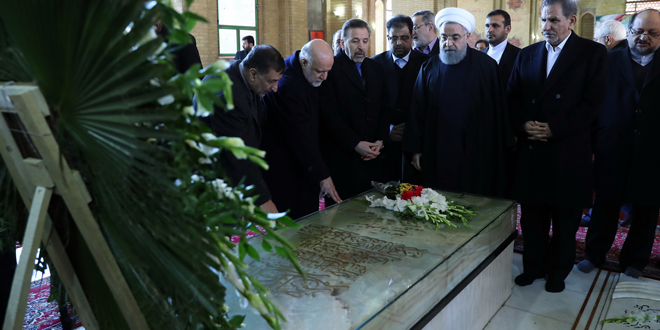
In tonight’s program of Behind the Headlines our guests, political commentators Hassan Shariatmadri and Sadegh Zibakalam will join us in discussions to find out why ayatollah Khomeini opposed the Shah’s White Revolution and the right to vote for women; since when Khomeini had been in secret contact with American officials; why did he oppose the grand ayatollah Shariatmadari; how the religious establishment in Iran has evolved since the Islamic revolution and is the regime that Khomeini left behind 29 years ago reformable at all?
Hassan Shariatmadri:
With the victory of the Islamic revolution and the rise of the clergy the independence of Iran’s religious establishment from the state disappeared. In the Shia theological beliefs a religious regime is responsible to carry out the divine justice by taking over the state apparatus.
Sadegh Zibakalam:
The theory of Velayateh Faghih by which the Iranian regime operates raises very many questions such as do we really have such a notion in Islam? Are the clergy supposed to be in political power themselves? Have we had any period in our history that a similar system of governance has ruled? If yes, has it been successful?
Hassan Shariatmadri:
After the death of ayatollah Boroujerdi, Khomeini had taken up a radical stance against the previous regime and came to see my father to join him in his opposition to the Shah.
My father had set a condition that any action must be coordinated between them but Khomeini issued the 15th of Khordad statement against the Shah’s reforms by himself and then and there my father split with him and became the grand ayatollah leading the Shias of the world.
My father’s struggle for reforms were entirely legal but Khomeini through a man called Kooh Komreyie was in secret contacts with the Americans and had told them that they should not take his slogans seriously as he was in favor of closer relationship with them to stop the growth of communism in Iran.
Sadegh Zibakalam:
Sadly I do not believe some of Mr. Shariatmadari views. The Shah was not a reliable person of the 1953 coup against Mossadeq.
In the 1960 the government of Dr. Amini had started a package of reform with the help of the US government but he had declared the he was not an American puppet.
But the Shah’s reforms did not make him a democrat and he still wanted to continue with his authoritarian style of ruling.
Khomeini was never a typical religious man. He was a politician in the clothes of the clergy and sought political power from his religious stance.
Hassan Shariatmadri:
Not at all! Mr. Zibakalam does not know Khomeini at all. He was not even a politician. He was just a power hungry figure to establish his type of dictatorship that defies all democratic and human rights of the Iranian people. He had not even written a religious book and was an ultra conservative clergy.
Sadegh Zibakalam:
What Khomeini did to his old associates is indefensible. But I still think this regime can be reformed.
Hassan Shariatmadri:
Is a regime that executes four thousand people without any justification in a matter of days reformable?
Khomeini was just another Stalin, Mussolini and Hitler.
 khalijefars News, Blogs, Art and Community
khalijefars News, Blogs, Art and Community








